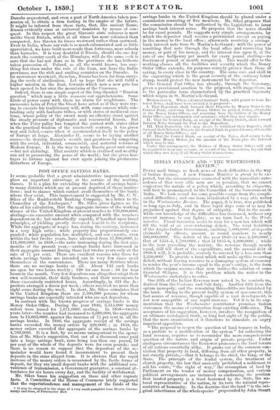POST OFFICE SAVINGS BANKS.
IT seems probable that a great administrative improvement will place an important advantage at the service of the working classes. It is a plan for extending the benefits of savings banks to many districts which are at present deprived of these institu- tions ; and to classes which cannot avail themselves of the banks where they exist. This improvement is suggested by Mr. C. W. Sikes of the Huddersfield Banking Company, in a letter to the Chancellor of the Exchequer.* Mr. Sikes gives figures as the data of his calculation, that the aggregate income of the working classes of the United Kingdom at present reaches to 170,000,0001. sterling—no excessive amount when compared with the numbers dependent on it; but undoubtedly capable, if handled upon broad principles, of yielding greatly increased benefit to its recipients. While the aggregate of wages has, during the century, increased in a very high ratio ; while property has proportionately ex- panded ; while population has multiplied, and our exports, even within the last twelve years, have advanced from 57,800,0001. to 111,600,0001. in 1858,—the ratio increasing during the first nine months of the present year,—savings banks have increased in their aggregate amount during those last twelve years only at the rate of 71 per cent. There are excellent reasons why those for whom savings banks are intended can in very few cases avail themselves of the convenience. There are many districts where there are no savings banks at all. About 142 such banks are open for two hours weekly ; 120 for one hour ; 50 for four hours in the month. Very few depositors can altogether adapt their own self-restraint, their daily business, and their movements to these excessively restricted hours. Accordingly, in 331 the de- positors averaged a dozen per week ; others received no more than eight sums during the week. In short, Mr. Sikes calculates that in the United Kingdom there are 2,500,000 persons for whom savings banks are especially intended who are not depositors.
In contrast with the known progress of savings banks is the Money Order Office. During the year 1846, 3,515,000 money orders were issued for 7,071,0001. sterling. In 1858—twelve years later—the number had increased to 6,689,000, the aggregate sum to 12,662,0001. against the increase of 71 per cent in all the savings banks. In 1846, the aggregate receipt of the savings banks exceeded the money orders by 229,0001.; in 1858, the money orders exceeded the aggregate of the savings banks by 4,760,0001. It is a fact, by no means unimportant to the opera- tion of Mr. Sikes's suggestion, that out of a thousand sums paid into a large savings bank, none being less than one pound, 78 per cent of the whole of the deposits were for even pounds; and there is no reason to suppose that the depositors of the re- mainder would have found it inconvenient to present their deposits in the same aliquot form. It is obvious that the rapid increase of the money orders is occasioned by the facile forms of deposit, for they are small deposit banks with the additional con- venience of transmission, a Government guarantee, a constant at- tendance for six hours every day, and the facility of withdrawal. Mr. Sikes bases his suggestion on these and other cognate facts. A Committee of the House of Commons lately suggested that the superintendence and management of the funds of the
• It may be obtained in the shape of a very small pamphlet from Messrs. Groom- bridge and Sons, of Paternoster Row
savings banks in the United Kingdom should be placed under a commission consisting of five members. Mr. Sikes proposes that the commission should be authorized by the Legislature to issue savings bank interest notes. He proposes that the notes should be for exact pounds. He suggests very simple arrangements, by which the depositor shall receive a provisional receipt on paying in the money to the local office ; afterwards receiving a savings bank interest note from St. Martin's-le-Grand; with the power of remitting that note through the local office and recovering his money, or part of his money, and the interest due upon it, at the rate of one halfpenny per month for every pound sterling—no fractions of pound or month recognized. This would offer to the working classes all the facilities and security which the Money Order Office extends, for purposes scarcely greater than those of saving, to every class in the country. The same care and skill in the engraving which is the great security of the ordinary letter stamp, would protect the new instrument for the depositor.
The General Post Office has already, through the Secretary, given a provisional sanction to the proposal, with suggestions as to the particular form characterized by the practical ingenuity which reigns in St. Martin's-le-Grand.
MEMORANDUM. When a Central Savings' Bank, with power to issue In- terest Notes, shall have been created it is proposed— I. That Depositors shall forward their Deposits by Money Order to the Central Bank, enclosing their Money Orders in printed forms, obtainable at the Money Order Offices, and receiving from the holders of the Money Order Offices any information and assistance which they may require. II. That the Central Bank, on receipt of the Money Orders, shall forward Interest Notes through the Yost to the Depositors.
III. That Depositors who may desire to withdraw their Deposits, shall forward their Interest Notes to the Central Bank in printed forms, obtainable at all Money Order Offices;
IV. That the Central lank, ou receipt of the Notes, shall return to the Depositors Money Orders for the amount of the Notes plus the Interest which may be due.


























 Previous page
Previous page